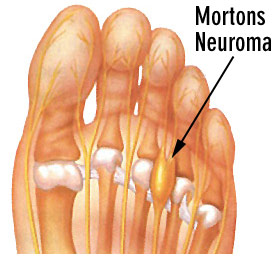16/09/2016

What is a Morton’s neuroma?
The name Morton’s neuroma is probably known by many. It is the common name given to repetitive compression of a plantar digital nerve found in the ball of the foot. Constant pressure and irritation of the nerve by surrounding structures can cause a neuroma to form. The body tries to protect the nerve by increasing the thickness of the nerves insulating sheath.
A Morton’s neuroma commonly forms between the 2nd-3rd or 3rd-4th toes.
How did I get this?
Common causes of a Morton’s neuroma include; abnormal foot motion. This can forefoot increase friction or foot instability. Footwear! Pointed shoes or high heels can increase pressure across the forefoot.
If I had a Morton’s neuroma, what would it feel like?
You may feel a burning discomfort, shooting or sharp pain, numbness or pins and needles near the toes or under the ball of the foot. Pain is usually felt when wearing tight or narrow shoes and may disappear when they are removed.
What do I do next?
Should be treated conservatively initially to address the causative factors.
- Ice to the area
- Again ladies – avoid high heels!
- Check the width of your footwear. Try wearing wider shoes with a lower heel. Tighter or narrow footwear can compress and bunch the toes together. Your podiatrist can help you with footwear assessment and recommendations.
The exact cause of Morton’s neuroma can be different between patients. An accurate diagnosis can be made by a podiatrist.
- You may require orthotics to alleviate the forefoot pressure and mechanics in combination with metatarsal padding.
- Additional, ultrasound imaging maybe required to consider other diagnostic possibilities (as mentioned in first post).
- In more serve cases a course of anaesthetic and cortisone injections.
- Surgical removal of the neuroma as last resort.
Don’t forget, a neuroma is a result of a nerve that is being traumatised by a poorly functioning foot or footwear and treating the cause of this condition is paramount.
Please contact our team at The Podiatry Group to have an assessment on 1300 847 226.
